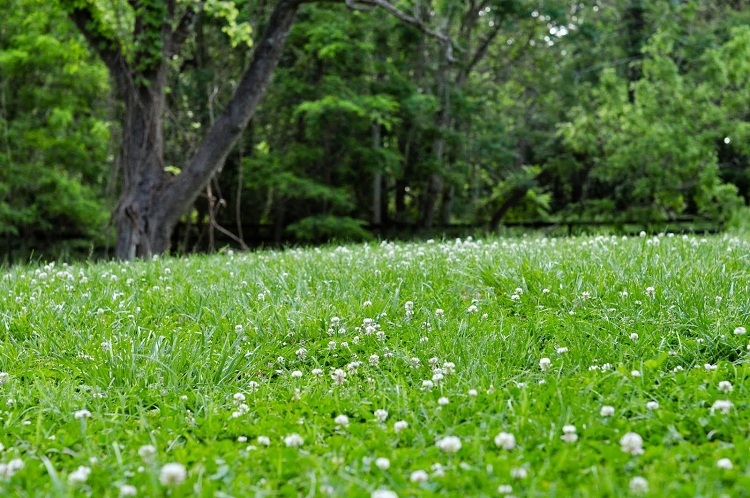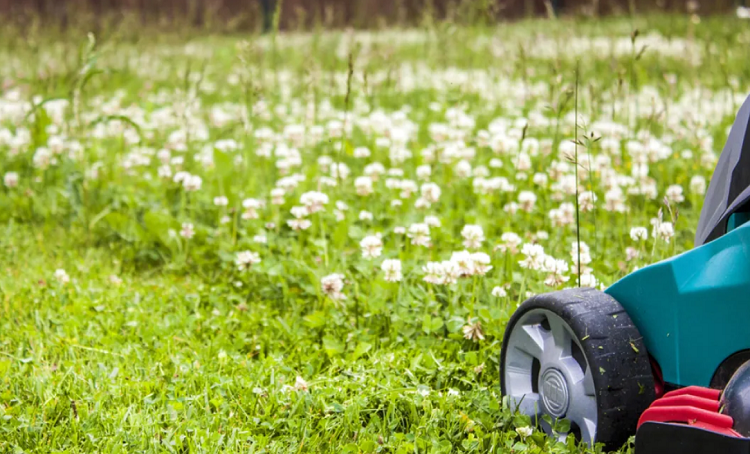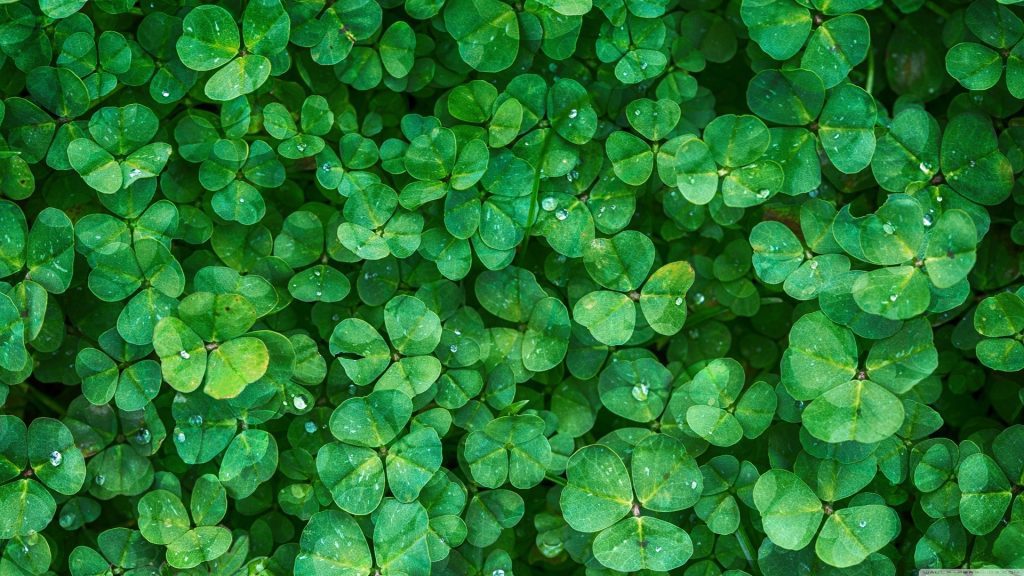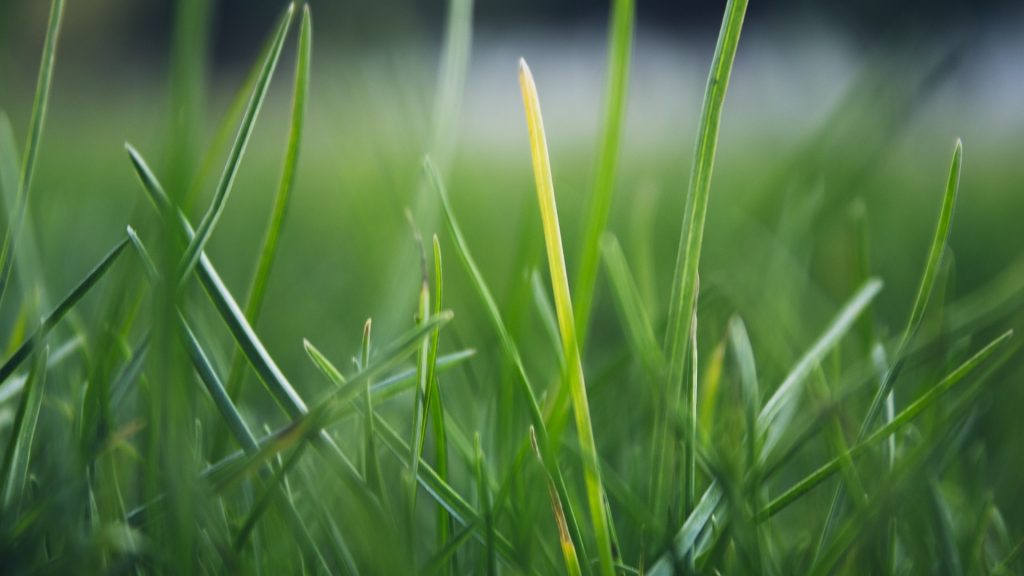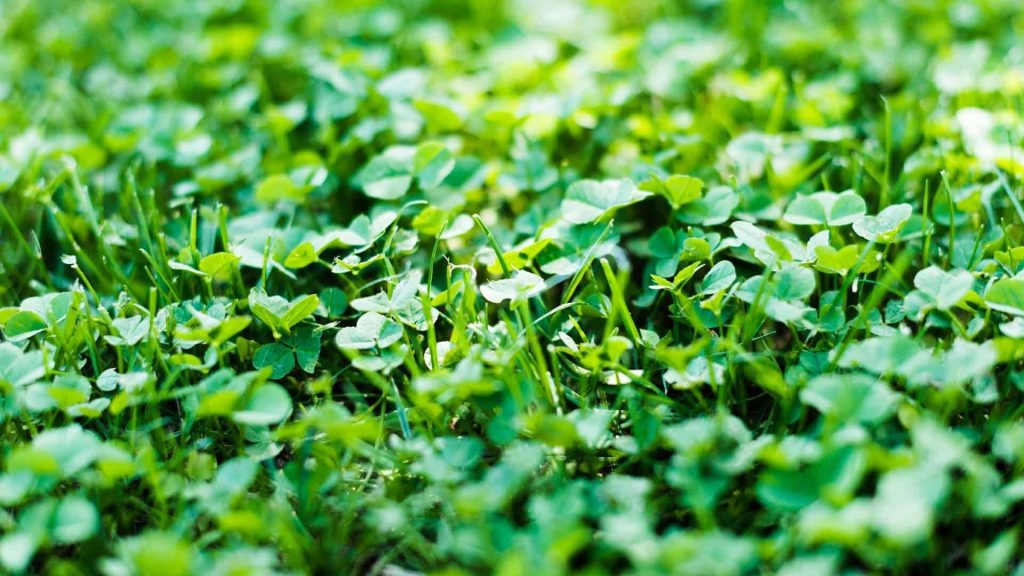
Best Clover Seeds For Your Lawn
Publushed by:
RebeccaLast updated:
May 6, 2022BEST OVERALL
Scotts Turf Builder Clover Lawn
- Detailed package
- Bright green color
- 5-7 days to grow
RUNNER-UP
White Dutch Clover Grass Seed
- Versatile
- Cotton packaging
- 5,000 sq ft coverage
ALTERNATIVE
X-Seed MicroLawn Grass & Micro-Clover
- Tolerant to foot traffic
- Safe for pets and children
- Up to 1,000 sq ft coverage
If you’re struggling to achieve a beautiful green lawn, such as because your soil displays poor quality in some areas of your garden, you might want to consider mixing clover into your existing grass. This is because it’s a nitrogen-fixing plant, so as it grows it provides the soil with nutrients.
Do you need to fertilize clover? The additional benefit of using clover grass in your lawn is that it doesn’t need to be fertilized, so you can reduce or even stop fertilizing your grass when you mix clover into it.
With this in mind, let’s explore the best clover seeds for your lawn. These will bring your lawn back to health and make it look greener than ever.
Best Overall: Scotts Turf Builder Clover Lawn
Short summary
This is the best clover for your lawn because it can easily be added to your existing lawn. It’s focused on helping you to do less maintenance on your lawn while still looking its best.
It’s formulated with strawberry clover, which is a type of clover grass that becomes established quickly.
Strawberry clover is beneficial for your lawn because of how it’s naturally self-fertilizing, especially when the clippings of clover are returned to your grass. It grows in a variety of soils, which makes it versatile.
How it works is that strawberry clover and nitrogen-fixing bacteria convert nitrogen in the air into nitrogen so that it can be used as nitrogen fertilizer for your grass.
This best clover grass will also retain its green color, even during short periods of drought, so if you live in a harsh climate it’s guaranteed to keep your lawn looking fresh and nourished.
It’s strong enough to grow in salient, tough soils, so it’s perfect if your lawn needs a pick-me-up but you don’t want to have to put in effort to enable grass to grow.
Quick Facts
- Weight: 2 pounds
- Expected Planting Period: when rainy season starts, in spring
- Color: Bright green

Pros
- 5-7 days to grow
- Detailed package
- Good tolerance to grass fungus
- Bright green color
Cons
- Small seed pack
Runner Up: White Dutch Clover Grass Seed
Short summary
This clover seed pack contains 98 percent pure live seed without any fillers in it, so you can be sure that you’re giving your lawn pure seed that will benefit it and help it to grow.
It’s a low-maintenance and low-cost solution to boost the health of your lawn. It gives your soil nutrients and makes your garden greener, so it’s great for filling in those unsightly bare spots in your lawn.
This is especially great for adding to problem areas or shady spots in your lawn. As with other clover varieties, this one prevents you from having to fertilize your lawn, so you can save money on your gardening tasks while enjoying a beautifully green property.
These best clover seeds for lawn are of the Dutch white clover variety, which is a versatile and popular type of perennial clover. It’s ideal for use in pasture mixtures and can be successfully used in ground cover and lawns.
It works well to prevent erosion and it’s one of the most popular clover grasses that you can find in lawn mixtures.
To ensure that you can enjoy a healthy lawn, it’s good to know that the manufacturer only uses high-quality grass varieties that are rated by the National Turfgrass Evaluation Program.
Quick Facts
- Weight: 2 pounds
- Expected Planting Period: late winter to early spring
- Color: Green

Pros
- Versatile
- Cotton packaging
- Covers 5,000 sq ft of lawn
- Resistant to foot traffic
Cons
- Requires a lot of water
- No instructions
Alternative: X-Seed MicroLawn Grass & Micro-Clover
Short summary
This MicroLawn grass doesn’t need any fertilizer, it crowds out weeds so that your lawn can be healthier, and it’s ideal for both sunny and light shade conditions. It can successfully grow in partial shade.
This makes it easy to use and ensures that your lawn can be lower maintenance to look after.
This seed pack contains micro-clovers which provide your lawn with all the benefits you’ll gain from traditional clover, and the micro-clovers feed nitrogen into the grass. This makes your lawn healthy and dense. Thicker lawns are more resistant to disease and they crowd out weeds while looking beautiful.
If you want a gorgeous lawn throughout the year, this is the seed pack to buy because it will ensure that you can keep your lawn healthy no matter what the weather throws at it. It’s also healthy for your grass and soil because of how it reduces nitrogen run-off as well as the use of chemicals.
Unlike some other clover seeds on the market, this one doesn’t require a lot of watering. Moderate amounts of water are enough to keep your lawn looking lush. It provides you with hearty grass that grows quickly without requiring much.
Quick Facts
- Weight: 5 pounds
- Expected Planting Period: N/A
- Color: Green

Pros
- Versatile
- Tolerant to foot traffic
- Safe for children and pets
- Covers up to 1,000 sq ft of lawn
Cons
- Doesn't work well in bare spots
- Expensive
Alternative: Outsidepride White Dutch Clover Seed
Short summary
This is another clover seed product that makes use of white Dutch clover seed. You’ll love how versatile it is, as you can use it as ground cover, in food plots, to prevent soil erosion, and even as a manure crop.
It can be grown in various regions and it’s a perennial seed. It can easily be used as a lawn alternative if you’re sick and tired of trying to grow grass.
If you follow the correct germination process, this Outsidepride seed can start sprouting within just two weeks. What sets it apart from other competing brands on the market is that the seed has been coated with an inoculant.
This encourages better establishment during germination, ensuring a higher level of planting success.
It’s really easy to use. All you have to do is scatter your seeds, lightly rake them, and then keep your seeds moist until they sprout. This makes it great for gardening pros and beginners alike.
White Dutch clover has many benefits, such as attracting butterflies and bees, it spreads easily to fill in bare spots in your lawn, and it gives nitrogen to the soil. This is why it’s such a popular type of clover to use in your lawn.
Quick Facts
- Weight: 2 pounds
- Expected Planting Period: late winter or early spring
- Color: Green

Pros
- Tolerates low mowing
- Grows effectively in clay soil
- Resistant to winter temperatures
Cons
- Doesn't meet stated coverage
- Battles to grow in poor soil
Alternative: Outsidepride Red Clover Seed
Short summary
These clover seeds are of the perennial red clover variety. They grow in a variety of areas and regions across the U.S.
This type of clover is a short-lived perennial that lasts for between three and five years but you can make it last longer as a result of self-seeding. You can use red clover for a variety of applications, such as hay silage, cover crops, pasture mixtures, and food plots.
This best clover lawn can adapt to a variety of climates and conditions, fertility levels, soil types, and use patterns. Best of all, it’s really easy to establish this type of clover. It grows quickly and fixes nitrogen into the soil to encourage faster growth.
Red clover is naturally resistant to pests and disease, so it will remain healthy and reduce your gardening costs.
Note that you should typically grow this type of clover with cool-season grasses but it can also be used for some warm-season grass types. It can be grown on its own or combined with grass. What you’ll love about red clover is that when it’s well adapted and grown successfully, its yield is higher than that of other types of clover.
It’s also got a longer growing season than any other type, which makes it an appealing option if you want to makeover your lawn.
Quick Facts
- Weight: 10 pounds
- Expected Planting Period: late winter to early spring
- Color: Green

Pros
- Quick growth
- Good ground cover
- Works well as a nitrogen
- Not strong smell
Cons
- Some packs specify the type of clover inside them
Clover For Lawn FAQ
If you want to grow a clover lawn, there are some things you might have wondered about, such as if clover is a good alternative to grass and if your furry friends will be able to safely walk on it.
Does clover make a good lawn?
If you want an alternative to growing grass, especially if soil conditions in your region are not up to the task, you should consider growing clover instead.
It’s environmentally friendly and extremely low maintenance because it doesn’t require regular mowing. Best of all, clover naturally attracts pollinators, such as butterflies and bees, to your garden.
Not only does clover remain green, but it draws nitrogen from the environment so that it can nourish and replenish the soil. This makes it work as its own fertilizer, again cutting back on how much gardening maintenance you need to do.
Since clover grows dense and thick, and it spreads quickly, it crowds out weeds so that they can’t gain a foothold in your lawn.
That said, there are some potential drawbacks to be aware of when planting clover in your lawn. These include the following:
- Clover can stain clothing more than grass. These stains are difficult to eliminate so be careful when having picnics in your garden!
- It can handle foot traffic, but it should be combined with grass to ensure an even tougher and more durable lawn.
- Since it’s a short-lived perennial, you might have to replant your clover every three years. This is especially the case if it doesn’t self-sow.
- Clover attracts bees, which can be problematic if you have, or someone else in your household has, an allergy to these pollinators.
What kind of clover is best for lawns?
Some of the most popular types of clover to use in your lawn include Dutch white clover and microclover, which are both beneficial and durable. Dutch clover grows a bit taller than microclover, which is a bit more compact.
There are some other differences between the two.
- Dutch white clover stays green all year ‘round and produces a large number of flowers to attract bees. It spreads quickly and can be seen as invasive.
- By comparison, microclover is a variation of white clover but it has smaller leaves and doesn’t bloom in such a large quantity. Since it grows closer to the ground, it’s ideal for use as ground cover.
There are other types of clover that can be used in your lawn, but they’re not as popular. They still have benefits, though. These include the following:
- Strawberry clover. This grows well in all types of soil, so it’s versatile, but it doesn’t thrive in areas where there are extreme temperatures. It gets its name because of how it has florets that ripen and become pink to mimic strawberries.
- Red clover. Not to be confused with strawberry clover, red clover is a bit more tender than other clover varieties. It blooms purple flowers – not red as you might have assumed – so it’s beautiful in wildflower gardens. It has a fast-growing rate and can tolerate a variety of soil types.
Is clover safe for dogs?
If you own dogs, you’ll naturally want to be sure that if they eat clover it won’t harm them. The good news is that clover is safe for dogs. However, when consumed in large quantities, it can cause unpleasant side effects such as diarrhea.
It can also cause kidney damage, as a result of how it contains oxalate crystals. These are toxic to dogs.
It’s also good to keep an eye on your clover to be sure that it’s not infested with fungus. This is toxic to dogs, so make sure that it’s not present on your clover before your dog eats it.
While you might want to keep an eye on Fido to ensure he doesn’t eat too much clover, you’ll be pleased to know that it doesn’t taste that great so your dog’s unlikely to want to eat a lot of it.
It’s also reassuring to know that since you don’t need to use chemicals to treat your clover lawn, this prevents your dogs from coming into contact with harmful chemicals, such as herbicides.
Can you mow clover?
While you might love the idea of planting clover in your lawn because of how it doesn’t have to be mowed like grass in order to prevent it from getting out of hand, there are times when you can and should mow clover.
If you want to remove the flowers your clover blooms, you can mow them. However, when first established a clover lawn won’t bloom until after its first year. After that time has passed, you can mow the lawn once per week to manage its flowers.
You can cut the clover down to about two inches to remove its blooms, and then allow it to grow a little more to three inches.
Another instance when it’s beneficial to mow clover is if you’re growing it with grass. This will ensure that your lawn looks neat and tidy. Cutting your clover regularly will also help to keep it healthy and keep annoying weeds at bay.
However, note that during times of drought or extreme heat, you shouldn’t mow your clover. This will put stress on the plants and kill them off.
Can you use clover for a year to replenish soil for a lawn?
Planting clover has many benefits to your soil. These include the following:
- Clover has a combination of tap roots and fibrous roots that aerate the soil so that grass can grow healthier in it.
- Clover is durable and protects the soil from both water and wind erosion.
- Decomposing clover helps to add organic matter to the soil to nourish it.
- Since clover is full of healthy nutrients for your soil, such as nitrogen, it prevents you from needing to use fertilizers.
- Clover works well as a natural mulch so that you can protect your soil.
You can grow clover for just a year. Annual clover varieties are a good choice as they complete their life cycles in one year. But, perennial clover such as white Dutch clover grows again reliably.
This is what makes it more ideal to use as ground clover than annual clover species, as the latter requires reseeding if you want to keep them for longer than a year. Perennial clover self-seeds so it spreads well.
Conclusion
Growing a lush, healthy lawn doesn’t have to be difficult, time-consuming, or feel impossible. Switching over to a clover lawn, either on its own or mixed into your existing grass, can make all the difference.
You might not have known which clover was best for your garden, but after reading our reviews of the best clover seeds for your lawn you have five options to take your lawn to the next level.
We’ve also featured some important information you should know about planting clover and how to make it most effective, such as what clover varieties are best for lawns.
Resources:
Scotts Turf Builder Clover Lawn
- Detailed package
- Bright green color
- 5-7 days to grow
Quick links
Rebecca
Rebecca Vargas is an experienced gardener and landscaper and has been rendering professional services for many years. Her services cover both private homes and commercial properties. Leveraging that rich experience, Rebecca Vargas now dedicates a chunk of time to show just about anyone how to maintain their garden and yard, whether at home or workplace. GreenIQ is his way of reaching and teaching millions of homeowners across the globe about proper gardening and lawn care practices.




